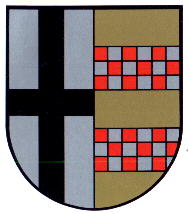Swisttal: Difference between revisions
Jump to navigation
Jump to search
Knorrepoes (talk | contribs) m (Text replace - "'''Origin/meaning :'''<br/>" to "====Origin/meaning====") |
Knorrepoes (talk | contribs) m (Text replace - "|width="15%"|50 px|right |}" to "|width="15%"|50 px|right |}<seo title="Wappen, Gemeindewappen" />") |
||
| Line 3: | Line 3: | ||
|width="70%" align="center" |'''Heraldry of the World<br/>Civic heraldry of [[Germany]] - [[Deutsche Wappen|Deutsche Wappen (Gemeindewappen/Kreiswappen)]]''' | |width="70%" align="center" |'''Heraldry of the World<br/>Civic heraldry of [[Germany]] - [[Deutsche Wappen|Deutsche Wappen (Gemeindewappen/Kreiswappen)]]''' | ||
|width="15%"|[[File:Germany.jpg|50 px|right]] | |width="15%"|[[File:Germany.jpg|50 px|right]] | ||
|} | |}<seo title="Wappen, Gemeindewappen" /> | ||
Revision as of 18:42, 5 November 2012
| Heraldry of the World Civic heraldry of Germany - Deutsche Wappen (Gemeindewappen/Kreiswappen) |
SWISTTAL
State : Nordrhein-Westfalen
District (Kreis) : Rhein-Sieg Kreis
Additions : 1970 Buschhoven, Dünstekoven, Essig, Heimerzheim, Lüdendorf, Miel, Morenhoven, Odendorf, Ollheim, Strassfeld
Origin/meaning
The arms were granted on September 24, 1970.
As combination of the old arms was impossible, the new municipality choose to continue the arms of the former Amt Ludendorf. It shows the cross of the State of Köln and the two bars of the Lords of Tomburg. About half of the villages belonged to Köln, the rest was ruled by the Lords of Tomburg.
Literature : Nagel, R. Rheinisches Wappenbuch, 1986.

